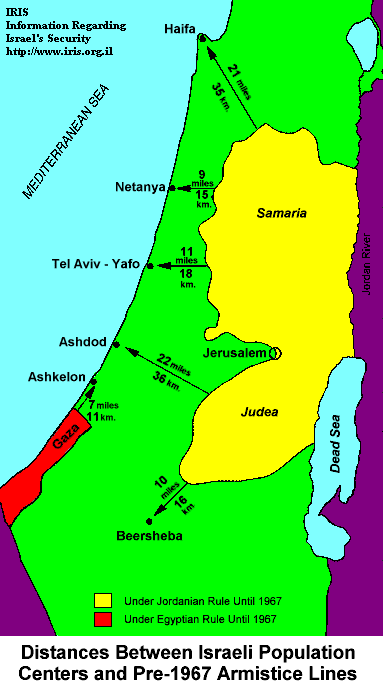 This post in the series dealing with recent Israeli history (here’s the Intro and Part 1) details the events of the 1960s, a critical – and perhaps the critical – decade for examining the region. It was in this decade that the Israeli-American alliance was forged and the “occupied territories” became occupied.
This post in the series dealing with recent Israeli history (here’s the Intro and Part 1) details the events of the 1960s, a critical – and perhaps the critical – decade for examining the region. It was in this decade that the Israeli-American alliance was forged and the “occupied territories” became occupied.
The decade began with a new American President: John F. Kennedy, and a sea-change in American attitude toward Israel. One of the great ironies of history: the president who first exposed the Nazi concentration camps to America (Eisenhower) became the most anti-Israel president in the 20th century, while his successor – the son of an Irish pol who ruined his career as an isolationist in the 1930s (Kennedy) – made Israel an American ally and arms recipient. In the view of the Kennedy Administration, Israel was in peril and had to be defended from its Arab enemies.
Fortunately for Washington and Tel Aviv, said enemies were in complete turmoil. Gamal Abdel Nasser, tried to expand his United Arab Republic beyond Egypt and Syria to include all Arabs. In 1961, a military coup in Syria ripped it out of the UAR and left Nasser with just Egypt. While Nasser contined to pine for Arab unity, Syria suffered a series of weak regimes and violent turmoil until the Ba’ath Party took over in 1963. A similar Ba’athist putsch in Iraq led to a three-way effort at Arab unity in Cairo . . . which fell apart. Iraq’s Ba’athists were bounced from power by the end of the year. More instability plagued both countries.
Nasser, meanwhile, grew ever closer to the Soviets, as did the various Syrian and Iraqi regimes. Only Jordan and Lebanon remained close to the West and less than beligerent towards Israel.
Then came 1967. By this point, Syria’s Ba’athists were in radical Marxist mode; Jordan’s King Hussein was under internal pressure for not being anti-Israeli enough; Iraq was now firmly in Nasser’s corner again; the Egyptian/UAR leader decided to make his move.
First, he tossed out UN peacekeepers who had been in Sinai since Israel withdrew from it in 1956. Then he blocked Israeli shipping from the Tiran Straits – the only way Israel could avoid the Suez Canal. Israel had repeatedly stated such a move was an act of war. That didn’t seem to bother Nasser, who on May 27 announced his plans for “the destruction of Israel” (BBC). Three days later, King Hussein solved his internal problems by signing a defense treaty with Nasser, one in which Nasser would control both Egyptian and Jordanian forces in case of war. On June 1, Israel’s ruling Alignment Party invited its opponents into a national unity government. The only question left was who would hit first.
As it turned out, it was Israel, and less than a week later (hence the term Six Day War), Nasser had lost the Sinai again, but Jordan also lost the West Bank and Syria – having come into the war on Egypt’s side, lost the Golan Heights. It was yet another dramatic military victory for Israel, except that unline 1956, the U.S. would not pressure them to give the gains back. Israel’s smashing victory with American arms over the Soviet-armed Egypt and Syria was considered a huge embarrassment to Moscow and a feather in Washington’s cap.
The Arab regimes went back into turmoil. Nasser resigned his post at the end of the war, only to reverse course the next day. Hussein dealt with more internal unrest, including the Palestinian Liberation Organization led by one Yassir Arafat. Syria’s Ba’athist dictatorship continued to rule, but not in a very stable manner.
Meanwhile, America held an election in 1968. While voters here focused on the Vietnam War and civil rights, the Middle East noted the leading figures were John Kennedy’s younger brother and Dwight Esienhower’s Vice President. Robert Kennedy was taken by a Palestinian assassin on the one-year-anniversary of the beginning of the Six Day war, while Richard Nixon was narrowly elected in November, leading everyone to wonder if he would follow in Ike’s footsteps.
Nasser would never be able to find out, he died in 1970 while trying to mediate a bloody civil war in Jordan between Hussein and Arafat’s group. That same year, Syria – who had intervened in Jordan on Arafat’s behalf – had another coup, this one led by Hafez al-Assad, who had apparently opposed the intervention in the first place.
So, much like in 1960, the Arab nations that would have wanted to eliminate Israel were felled by military defeats and internal turmoil. Unlike 1960, Israel now had large buffer zones and an American ally. It would take less than five years for both to become far less than met the eye, but that’s for Part 3.
Cross-posted to the right-wing liberal

